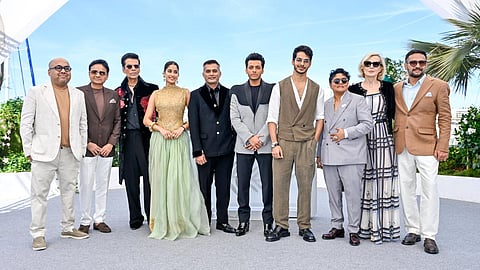For India’s marginalized, it’s a losing game. Every seeming climb gets undone by yet another structural prejudice ingrained in the collective psyche. Premiered in Un Certain Regard at Cannes, Neeraj Ghaywan’s Homebound underlines this in steady progression, while also mixing in occasional scatterings of hope. The two friends at the film’s center know well everything that is being pitted against their chances of triumph. One is Muslim, the other Dalit. But Shoaib (Ishaan Khatter) and Chandan (Vishal Jethwa) don’t abandon their pursuits so much as they twist changing stakes to best bids of survival. Before those come into play, they have to battle shame and self-erasure as fallout of their identities. Even as Shoaib takes up a temporary job, he buys a police officer’s cap and keeps it close as a reminder of his goal. Homebound is abundantly bleak—misery shoving into focus just when things seem promising. Yet there are also slivers of rapturous teasing, like sneaking into a friend’s house for biryani or jousting over a beloved pickle brought from home to the city.
Cannes 2025 | Homebound Review: Neeraj Ghaywan’s Blistering Drama Casts A Wide, Severe Look At India’s Chasms
Starring Ishaan Khatter and Vishal Jethwa, the director’s Un Certain Regard return provokes tough questions around vast, connected social matrices
Both Shoaib and Chandan sit for the police service exams but recruitments are put on hold for a year, results indefinitely delayed. They believe the police uniform is what will lift them beyond constant anxieties bound in faith and caste. For everything they do and aspire for, identity—social and religious—stands in between. Both come from farming families. Chandan holds back his surname to pass for the general category in application forms. He baulks at slipping his full name to Sudha (Janhvi Kapoor)—also sitting for the exam—with whom he forges an instant connection. When she shares her lower-caste surname, there’s a tinge of relief. Nitin Baid’s edit crisply struts forth. Later, a police superintendent viciously declares how ‘quota rats’ eat into everything, while the rest like him are left with just crumbs. On one hand, Chandan is caught between hiding and owning up to his identity in public spaces; on the other, Shoaib’s vocal, assertive attitude often seems to burst through at Islamophobic slurs. How long can one endure and let humiliations in the name of ‘joking’ pass? To protest risks losing everything, having to start all over again. Cricket matches with friends and office ecosystems only need a trigger to target and suspect him. Instead of being offered a chance to prove mettle, all he’s asked is to supply endless records—his parents’ IDs, his unimpeachable past.

Though Ghaywan’s screenplay doesn’t always hold subtlety in near sight, its emphatic, incisive intersectional understanding cleaves clear paths to the shattered heart of India’s political atmosphere. In an increasingly right-wing Hindu fundamentalist nation, those slipping through the cracks of hardened, preferred identity keep lurching between mere dreaming and absolute devastation. Caste, class, gender, religion—they are crucially delineated as enmeshed, yet Ghaywan is wise and probing enough to distinguish fault lines running through each structure. Nothing escapes the crushing weight of defined identity. At one point, Chandan regretfully remarks him being nothing but a ‘checkbox on a form’. The Chandan-Sudha track is as much about their growing affection as it is about ruptures borne out of differences between either’s view of empowerment.
Should he take the constable job, he’d be stuck at that his entire life. Nothing will change. A degree can widen his options. With her firm Ambedkarite principles, she exhorts that he looks at the bigger picture. He reiterates that he just can’t wait any longer. His house’s roof is leaking. Leaping at a government job makes more sense than hanging on for more years in getting a degree. At college, he’s almost lost in a sea of English-language classes. Simultaneously, he fishes for meanings in a dictionary.

Scenes like this decisive conversation between Chandan and Sudha—simple in design, thornily revealing in argument—imbue Homebound with acute nuance. Within a particular identity subset, there will be difference and debate in how they see their struggle. For every Chandan who’s just struggling to do what’ll benefit his family in the immediate, there’s a Sudha, passionate and determined to take the collective struggle forward. If there’s not a seat at the table, she’ll bring her own chair.
A deep, bristling sense of the generational haunts Homebound. Chandan urges his mother (an indelibly wrenching Shalini Vatsa) to put ointments on her prickled feet. She refuses, reminding him of his grandmother’s feet that were nothing less than sickles. “Feet is all the inheritance I’ve got,” she says. Chandan is the first in his family to get even the choice of a college education, denied to his sister Vaishali (Harshika Parmar), who desperately wanted it, more so than him.

Homebound’s impassioned brilliance is in how it threads the social and familial—the larger canvas of a community’s struggle for self-determination enfolding myriad intimate dramas. Naren Chandavarkar and Benedict Taylor’s score doesn’t push emotions so much as it pleats them into the narrative fabric, segueing inconspicuously into a moment’s swell. The tiniest of situations render a vivid dramatic impact, like migrants dropped from a truck ride in the middle of the night and nowhere, under COVID fears. Khatter and Jethwa buoy the film, etching an easy friendship that sings, frosts over, thaws and smashes hearts. They instantly capture our attention. Though the film’s final stretches lend a fervid, gutting showcase for the actors, they are equally tremendous in flickering snatches of few seconds. Watch out for a scene when giddy joy slowly shades to anguished realization on Khatter’s face—a quiet sadness filling his eyes. Pratik Shah’s camera bathes the characters in lovingly soft light, a gleam of tenderness. The few spare times the camera swoops high, unforgettable top shots blaze into the soul. One shows the friends straggling through parched landscape, the other of hordes of migrant workers silently walking at night lit by yellow street-light. There’s such gentleness and dignity with which Ghaywan and Shah depict these lives. Homebound is imperative viewing—as heart-tugging, discomfiting as enraging.
Homebound premiered in Un Certain Regard at Cannes Film Festival 2025.
Tags

